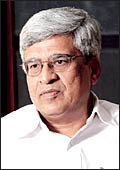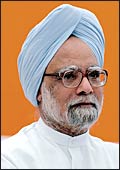 |
 |
| Left out in the cold: CPI(M)'s
Prakash Karat (left) and Prime Minister Singh |
The
dog is reclaiming control over its tail. The government refused
to buckle down on the issue of modernising the Delhi and Mumbai
airports; and the Left, which had threatened it with dire consequences-CPI(M)
leader Sitaram Yechury had even threatened to bring the government
down-has been forced to pipe down. This marks the first instance
of the Congress-led United Progressive Alliance government prevailing
over the Left on a contentious policy issue.
It also signals a hardening
of the Congress' stance vis-à-vis its Left partners. "The
Congress, as the lead party in the UPA, believes in the true dharma
of coalitions, which is to listen to and imbibe from all directions
in a genuine spirit of openness, but ultimately to take decisions
in supreme national interest only. No part of the coalition possesses,
or can exercise, any veto power. After the consultation process
is over, we cannot hesitate to agree to disagree if we find that
to be in India's interest," says the party's spokesperson,
Abhishek Singhvi. Comrade Karat, are you listening?
This desire to break free
from Marxist shackles has been in evidence over the past few months.
Prime Minister Manmohan Singh's enthusiasm for the nuclear deal
with the us, India's vote on Iran, and the government's recent
decision to allow foreign direct investment by single brand retail
chains all point to an increasingly assertive government signalling
that the tail can't continue wagging the dog indefinitely.
"The last word hasn't
been said on any of these issues," says CPI(M) leader Nilotpal
Basu, denying that the Left's ability to set the policy agenda
is on the wane.
Too late! The UPA has
called the Left's bluff. The door is now ajar; and time just right
to push through other contentious reform measures. The wish list:
pension reforms, labour reforms and FDI in (multi-brand) retail,
for starters. The dog that did not bark has helped fictional detectives
solve many mysteries. A Left that cannot bite may be just what
the Prime Minister needs to push reforms forward.
-Arnab Mitra
In Fine Fettle
The government's report card is full of As.
| THE DOCTOR'S PRESCRIPTION |
»
No disinvestment in core public sector enterprises
»
Government to set up new pay commission for its employees
»
Power sector reforms to continue; subsidy regime to stay
»
Govt to invest Rs 1,70,000 crore on the National Highway Programme
» A
"New Deal for Rural India" through a massive increase in rural
credit |
Twenty
months into office, Prime Minister Manmohan Singh is still far
from becoming a consummate and confident politician. He's quite
happy living in the political shadow of Congress President and
United Progressive Alliance (UPA) Chairperson Sonia Gandhi. But
his writ clearly runs on the economy and, reportedly, on foreign
policy issues, and the two areas bear his distinct imprint, despite
unrelenting pressure from the Left parties on both.
So, what are his major achievements as the
Chief Executive of the world's largest democracy? Singh himself
feels his government's commitment to equitable development and
generation of employment should occupy the pride of place.
"We've made major investments on this.
And taken together, our five major initiatives-the National Rural
Employment Guarantee Act, 2005, the National Rural Health Mission,
the Jawaharlal Nehru National Urban Renewal Mission, the Rajiv
Gandhi Vidyutikaran Yojana and the Bharat Nirman Yojana-will transform
the face of India and the lives of the ordinary people,"
he said at his second press conference as Prime Minister on February
1, 2006. It's early days yet; so it's best to reserve judgment
on that. Finding money for this grandiose vision will present
potentially insurmountable hurdles, but his sincerity and the
proven capability of his economic team may well carry the day.
The other obvious achievements were in sustaining
the growth rate of the country's gross domestic product at 7 per
cent-plus, keeping the inflation rate in check (it's expected
to be at less than 5 per cent for the entire fiscal) despite soaring
global crude prices and promising a new deal for rural India through
a massive increase in rural credit and the refinancing of cooperative
credit societies.
On the flip side, he's also committed to
setting up a new pay commission (the sixth) to review the salaries
of government employees. While this may win his party the loyalty
of this crucial section in the forthcoming Assembly elections
in six states, it can also throw public finances into disarray.
The government has also signed, or is in
the process of finalising, bilateral free trade pacts with several
Asian countries. These look good on paper, but their precise economic
impact on the country will have to await more detailed data and
analyses. But it's no secret that some Indian businesses are worried.
Singh has also promised to continue with
reforms in the power sector, even while categorically committing
his government to the continuance of power subsidies. This last
is obviously a carrot to his Left allies, as is his promise not
to sell any public enterprises in the core sector.
Overall, the report card looks good, but
with a little effort, it can get a lot better.
-Ashish Gupta
The To Do List Keeps
Growing
Several important Bills are pending in Parliament.
But not all of them will be passed anytime soon.
The
world over, legislators are called lawmakers. But our mps, it
seems, have time for everything else apart from legislating on
new laws. There were 62 Bills pending before both Houses of Parliament
at the start of the Winter Session. Now, on the eve of the Budget
Session, that number has shot up to 68. Several of these deal
with important, even critical, economic issues. And legislative
alacrity or inaction can greenlight or hold back laws that can,
potentially, add billions of dollars to the gross domestic product.
But has anyone informed our "honourable" mps about this?
| LIS PENDENS |
»
The Banking Regulation (Amendment) Bill,
2005
» The
Chartered Accountant (Amendment) Bill, 2005
»
The Essential Commodities (Amendment) Bill, 2005
» The
Electricity (Amendment) Bill, 2005
» Petroleum
& Natural Gas Regulation Board Bill, 2005
» The
Pension Fund Regulator and Development Authority Bill, 2005
» The
Reserve Bank of India (Amendment) Bill, 2005 |
Finance Minister P. Chidambram is very keen
that the Banking Regulation (Amendment) Bill, 2005, which allows
the Reserve Bank of India to lower the statutory liquidity ratio
and the cash reserve ratio of commercial banks, is passed ASAP.
In all likelihood, he will have his wish. Similarly, The Electricity
(Amendment) Bill, 2005, which puts the onus of rural electrification
on both the Centre and the states and mandates a steady reduction
in cross subsidies within the sector, is also expected to sail
through.
But the government's friends on the Left
will definitely not allow The Pension Fund Regulatory and Development
Authority Bill, 2005, which allows pension funds to be invested
in stocks, to pass. The Petroleum Natural Gas Regulation Board
Bill, 2005 seeks to establish a Petroleum & Natural Gas Regulatory
Board that will oversee the oil sector. But with no one really
pushing for it, the Bill may have to spend some more time on the
table of the House. The Essential Commodities (Amendment) Bill,
2005, which empowers the Central government to delete items from
the list of essential commodities, too, may not become law just
yet.
But that does not, of course, make our mps
any less honourable.
-Ashish Gupta
|






